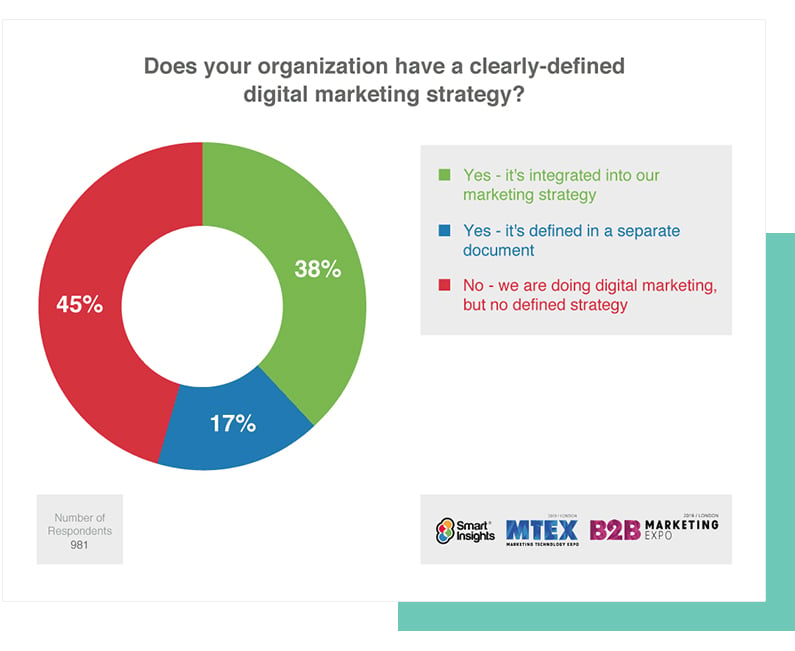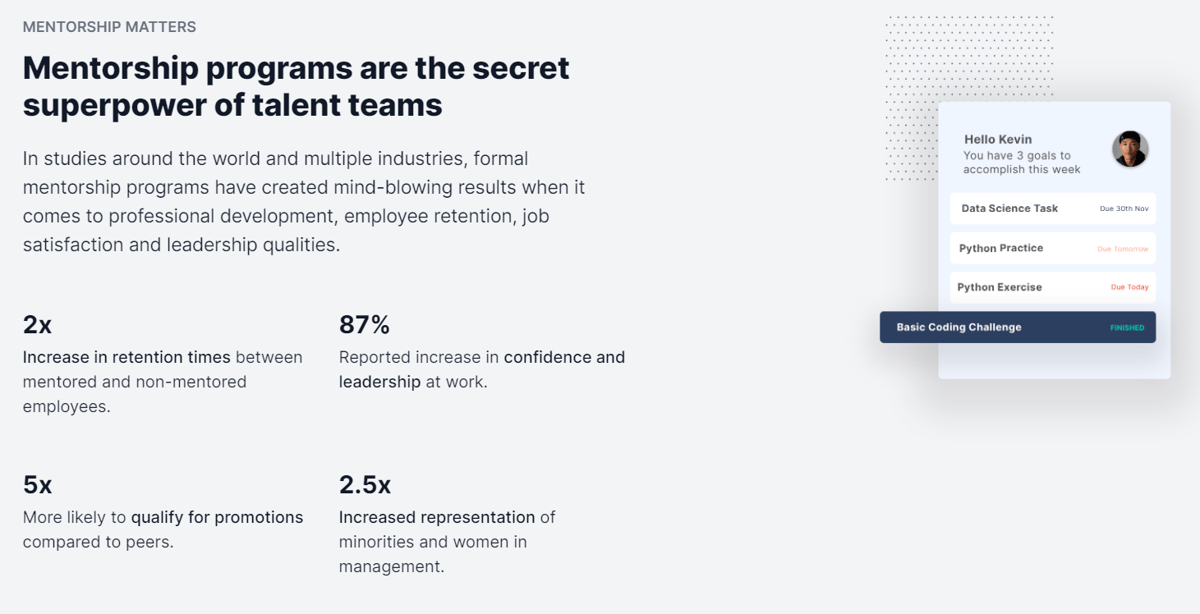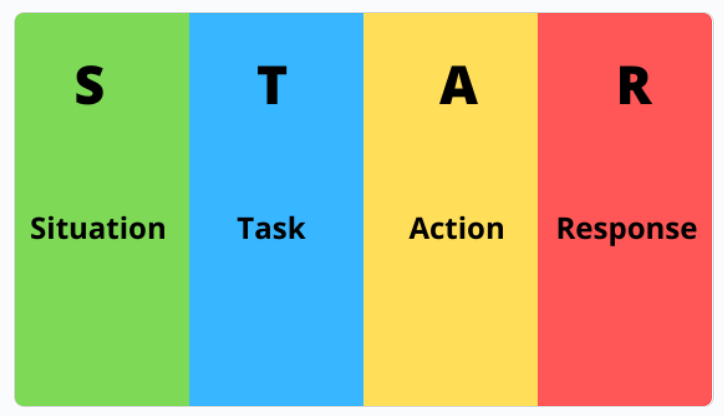At MentorCruise, we know that it’s essential for you to emphasize your skills and knowledge in the right ways during an interview.
This article will explore just that by discussing common interview questions for marketing directors, including those becoming increasingly important in our highly digital environment. We’ll also look at interview tips as well as sample answers using the popular STAR interview method. Let’s begin.
What are interviewers looking for?
A company hiring a marketing director will want to know that you have the right qualities to run successful marketing campaigns in our modern environment.
The qualities of a great marketing director include:
Being a clear communicator
Strong planning/organizational skills
Fantastic teamwork skills
Knowing how to deal with unhappy customers
The ability to adapt to different situations, such as a financial downturn
Critical thinking and the capacity to think outside the box
An ability to understand what customers need and want
A comprehensive understanding of the sales process
Great people skills all-round
How to stand out in a marketing director interview
The interviewer will evaluate you for qualities like those mentioned above. But that’s not all. They will also want to gauge your prior experience, long-term goals, and personality.
Show what you could bring to the company that other candidates are unlikely to offer. Don't be afraid to get across any unique marketing insights or approaches you have. Demonstrate why you are the best person for the job.
Truly knowing the ins and outs of marketing strategies, especially for digital marketing, can be very appealing to employers. In fact, research has shown that only 38% of organizations have a clearly-defined strategy for digital marketing.
Along with developing your career, mentorship for marketing could help take you to the next level.
Popular interview questions for a marketing director
What is a creative marketing approach you’d like to use with us if hired?
Discuss the marketing approaches you used to market a product or service in the past successfully? Why did you choose these strategies?
What marketing strategies would you employ to promote a product during a financial recession?
How are you managing the technical evolution of marketing, such as Google’s changes to how SEO rankings work?
What interested you in marketing in the first place?
Provide us with an example of a marketing project you led that did not go as well as intended. What did you learn from this experience?
How would you respond to a customer who has left a negative online review of one of our products?
Tell us what you know about our target audience?
Where do you see yourself in five years?
How have you worked with other teams/departments in the company when developing a marketing project?
Discuss an area in which your current employer is doing things better than us?
What do you find most appealing about our marketing campaigns, and how would you improve on them?
Looking at current sales data, what insights can you gather about our customers?
How do you explain your plan for a marketing strategy to someone without the relevant background and experience? How do you convince them of the plan’s merits?
What is your process for choosing who to invite to a product launch?
Tips on how to answer these questions
When answering director of marketing interview questions, you want to prove your value to the company.
Here are our top tips for answering marketing director interview questions:
Be ready with examples so that you convey your prior experience in the field. Explain how you’ve developed your skills and knowledge over time. Show your career growth.
Don’t be afraid to show creativity with your answers. Show how passionate you are about the role. This will further the company’s confidence that you have plenty to offer them on various fronts.
Tell the truth when answering their questions, as honesty is definitely the best policy, especially at this level.
Display confidence when answering questions and make it clear that you’re excited to answer each question.
Where suitable, show off your knowledge of different marketing areas, particularly in the online world. Examples of this would be email marketing copy, CTR, and LSI keywords.
Mention different marketing tools you use, where relevant, whether it be Ahrefs, HubSpot CRM, Zendesk, Google Keyword Planner, AdStage, and so forth.
Mentorship for your marketing team as a whole may also interest you as you grow and develop a team of superstar marketers.
Using the STAR method to frame your answers
The Situation, Task, Action, and Result (STAR) method is a technique interviewers use to obtain relevant information about your ability to meet specific aspects of the job.
As the interviewee, you can use the STAR method to frame your answers so that you tick off these boxes by providing valuable information to your potential employer. This is an intelligent approach to use whether or not the interviewer is consciously employing the STAR method in evaluating you.
Here are some examples of how you may use STAR to answer interview questions:
Question: What marketing strategies would you employ to promote a product during a financial recession?
Your Response:
Situation: “In March 2020, during the Covid-19 recession, most employees at the company I work, including myself, were forced to work from home. This meant facing a new working environment and preparing for changes in consumerism.”
Task: “With most of the country now spending much more time at home, I needed to change how I managed marketing projects. I was also making preparations for the expected decline in consumer demand, which would, of course, apply in any recession.”
Action: “Aside from increasing focus on social media and online sales, I made certain that we put more emphasis on our customer’s needs. This meant that we focused less on the standout features of our products and more on why these products would meet a customer’s needs, even during tough times.”
Result: “By preparing for increased social media engagement and a decline in consumer demand, especially in retail, we weathered the storm exceptionally well. Along with that, sales data showed evidence that shifting our focus more toward the needs of our customers helped to minimize a reduction in revenue.”
Question: How would you respond to a customer who has left a negative online review of one of our products?
Your Response:
Situation: “One time, a team member made me aware of a negative customer review on Amazon for one of our popular products. The review also had several upvotes.”
Task: “I like for our team to respond to as many negative customer reviews as possible. Rather than ignore the post, I believe it’s important to face negative feedback head-on and address the specific concerns the customer has.”
Action: “So I discussed this with the team member and advised them, particularly as they were a relatively new member of the team. They already understood the basics, of course, such as addressing the customer by name, apologizing, and using a sympathetic tone. But to add to this, I emphasized the importance of stressing that we’re working on the issue, and I decided we should offer the customer a small gift too.”
Result: “After the reply was sent, the customer responded a day later. They were still somewhat frustrated, but they were happy to know the issue was being worked on and thanked us for the gift. At the same time, we applied the feedback, which evidently led to improved customer satisfaction and retention based on some key KPIs.”
Question: Discuss the marketing approaches you used to successfully market a product or service in the past? Why did you choose these strategies?
Your Response:
Situation: “In summer 2021, we ran a referral program for one of our new company brands.”
Task: “I led the development and launch of a new website as well as social media pages for this brand. My goal was to make the new brand a hit right from the start and to bring the right amount of attention to our referral program.”
Action: “So we grew the website by adding extra elements such as a blog. We also focused on adjusting our SEO approach ahead of Google’s algorithm updates. I worked overtime to ensure we were bringing in potential customers in different ways, all while making them well aware of our referral program. We also made good use of behavioral marketing. All of these approaches helped to achieve our objectives.”
Result: “And in the end, I’m confident that we balanced things just right between maximizing CTR and increasing sign-ups to our referral program. In fact, our stats showed that the percentage of website users who signed up to that referral program was higher than with most of our brand websites, so it was certainly a success.”
Further guidance from MentorCruise
The interview questions for a marketing director we’ve looked at today would each be an attempt to decipher different things about you, such as your experience, abilities, and personality. By using the tips we’ve provided in this piece and employing the STAR method, you’ll have all the ingredients needed to pull off a stellar interview.
If you’d like, you could even book a mentorship session with MentorCruise today to help develop your interview skills in general.










